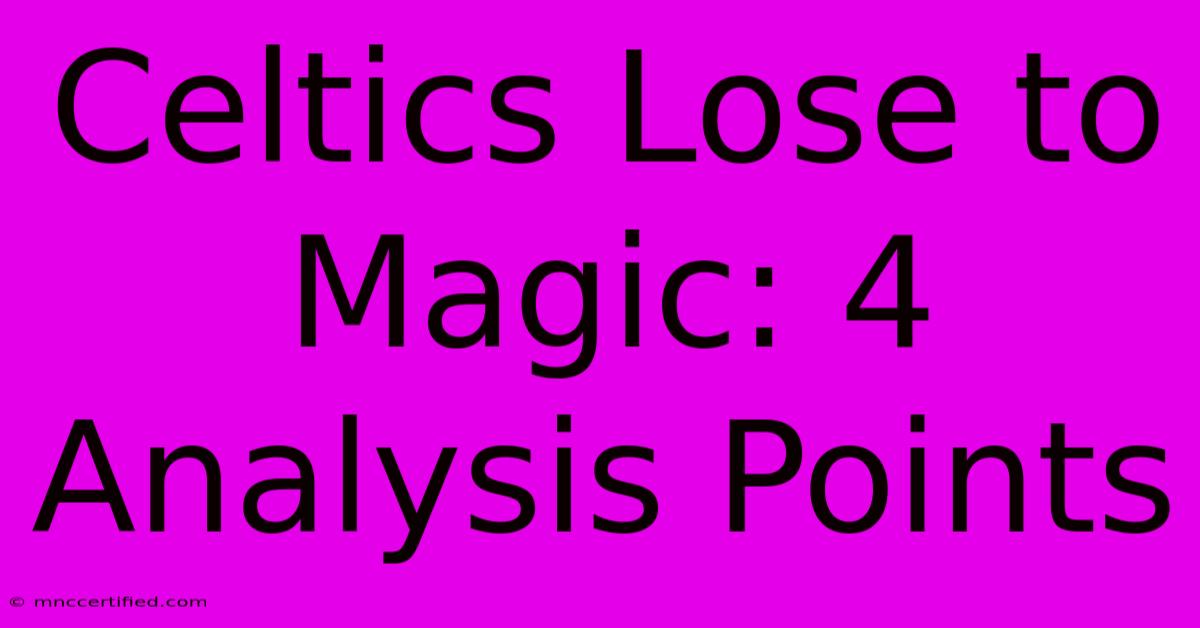Celtics Lose To Magic: 4 Analysis Points

Table of Contents
Celtics Lose to Magic: 4 Key Analysis Points
The Boston Celtics' unexpected loss to the Orlando Magic sent shockwaves through the NBA. While a single game shouldn't define a season, this defeat warrants a deeper look. Let's break down four key areas that contributed to the Celtics' downfall and what it might mean for their future prospects.
1. Defensive Breakdown: Orlando's Offensive Efficiency
The Magic's surprisingly efficient offense exposed significant weaknesses in the Celtics' usually stalwart defense. Orlando's high-percentage shooting, particularly from beyond the arc, highlighted a lack of consistent defensive intensity and communication. This wasn't just about missed assignments; it was about a systemic failure to contest shots effectively. The Celtics' normally suffocating perimeter defense seemed porous, allowing open looks and easy baskets. This performance raises concerns about their ability to maintain their defensive dominance against more potent offensive teams throughout the season. Analyzing film and identifying specific breakdowns will be crucial for Coach Mazzulla to address this issue before it becomes a recurring problem.
2. Offensive Stagnation: Lack of Ball Movement and Scoring Balance
The Celtics' offense, usually a picture of fluid ball movement and diverse scoring, appeared stagnant against Orlando. A reliance on individual heroics rather than team play contributed to a lack of offensive flow. The Magic's defense successfully disrupted the Celtics' rhythm, forcing contested shots and turnovers. The absence of consistent scoring from secondary players – often a hallmark of the Celtics' success – left Jayson Tatum and Jaylen Brown carrying an unsustainable offensive load. This over-reliance needs correction; fostering better ball movement and developing more reliable secondary scoring options is paramount. Improving their pick-and-roll execution and off-ball movement would greatly enhance their offensive fluidity.
3. Rebounding Woes: Dominated on the Boards
The Magic's dominance on the boards was a significant factor in their victory. Orlando's superior rebounding, both offensive and defensive, gave them extra possessions and limited the Celtics' second-chance opportunities. This aspect of the game underscored a lack of physicality and hustle from the Celtics' frontcourt. Addressing this deficiency requires a renewed commitment to boxing out effectively and securing rebounds consistently. This isn't simply a matter of talent; it's about effort, positioning, and teamwork. Strategic adjustments to their rebounding schemes could yield significant improvements.
4. Impact of Injuries and Fatigue: A Factor to Consider
While not an excuse, the potential impact of injuries and the early-season fatigue should be considered. Even minor injuries can disrupt team chemistry and performance. The long NBA season takes its toll, and the Celtics might have felt the effects of the demanding preseason and early games. This isn't to downplay Orlando's performance; rather, it provides context. However, the Celtics need to manage their players' workloads effectively and ensure that they are physically and mentally prepared for each contest. Regular monitoring of player fitness and strategic rest days are crucial to preventing these types of performance dips.
Conclusion: Learning from the Loss
The Celtics' loss to the Magic serves as a valuable lesson. It highlighted areas needing immediate attention: improving defensive intensity, fostering better offensive flow, dominating the boards, and managing player health. While one game shouldn't cause panic, this defeat underscores the need for adjustments and a renewed focus on the fundamentals. The Celtics have the talent to overcome this setback, but addressing these four key points will be crucial for their success in the coming weeks and throughout the season. The ability to learn from this defeat and implement necessary changes will be a key indicator of their championship aspirations.

Thank you for visiting our website wich cover about Celtics Lose To Magic: 4 Analysis Points. We hope the information provided has been useful to you. Feel free to contact us if you have any questions or need further assistance. See you next time and dont miss to bookmark.
Featured Posts
-
Jacobs 53 Yards Packers Dominate Early
Dec 24, 2024
-
Trump Renews Greenland Buy Offer
Dec 24, 2024
-
Understanding Trumps Canal Stance
Dec 24, 2024
-
Santa Tracker From Cold War To Today
Dec 24, 2024
-
Nordstrom Bought By Family For 6 25 B
Dec 24, 2024